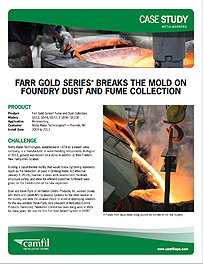
Case Study Details
Client Name
Watts Water Technologies
Application
Metalworking
Product
Gold Series Dust Collectors
PDF Download
Challenge
Watts Water Technologies, established in 1874 as a steam valve company, is a manufacturer of water-handling components. In August 2012, they broke ground on a 42-acre addition at their Franklin, New Hampshire location. The construction goals for this new expansion were to build a top-of-the-line facility that would follow tightening standards (such as the Reduction of Lead in Drinking Water Act effective January 4, 2014), maintain a clean work environment, facilitate employee safety, and allow for efficient customer fulfillment.
Brian and Kevin Flynn of Ventilation Control Products, Inc. worked closely with Watts and Camfil APC to develop systems for the older section of the foundry and were the obvious choice to assist in developing solutions for the new addition. Kevin Flynn, vice president of Ventilation Control Products, mentioned, “Ventilation Control has been doing work at Watts for many years. We sold the first Gold Series system in 2009."
A GS96 was installed on a core knockout system, which removed sand from metal castings. Kevin continued, “It was a very difficult application for Watts, so when we got the system installed and it worked great, they were very happy and had a positive image of how Gold Series collectors worked.” A second Gold Series unit (a GS12) was also installed on their powder paint lines.
Tyler Stone, director of operations for Watts, explained, “We’ve spent some time and effort designing what we feel is the next state-of-the-art foundry. We worked with a lot of great engineering minds to come up with what we think is the best way to make our product in today’s market with today’s technology.” The new addition was finished in the last week of April 2013.
Solution
“Watts was looking for high-efficiency dust collection equipment, so they asked me to provide them with some information for the right type of equipment to handle the various processes they have...sand, pouring, and finishing operations,” said Brian Flynn, president of Ventilation Control Products. Three additional Gold Series dust collectors were installed and are now integral to many of the operations at Watts, offering a variety of benefits to employees' well-being and the manufacturing process.
All Gold Series units installed at the new foundry have a variable frequency drive system: a 200-horsepower fan controlled by an integrated control panel to modulate the fan speed and maintain constant static pressure as filter pressure changes. “That saves a great deal on energy and increases filter life,” Kevin Flynn mentioned.
A Gold Series model GS108 was installed with a mining inlet to handle the green sand. “That enabled us to handle the large volume of sand coming into the collector in a way that no other cartridge collector would be able to do,” added Kevin Flynn. “Camfil APC’s experience in mining really helped us to convince Watts that the Gold Series would work in a sand application.” Watts was concerned about the high clay and moisture content in the sand. However, Gold Series units have been successful on more rigorous applications in the past—sand with higher moisture and clay content.

A Gold Series GS96 is used for metal fume collection.
For the metal melting system, a GS96 was installed with a spark trap inlet to combat potential fire hazards. The large GS97 has two inlets, which Watts took advantage of to serve different areas of the mill, saving additional energy. A third Gold Series unit, a GS72, was installed for finishing processes, specifically metal grinding and shot blasting which created very heavy dust. It has abrasion-resistant inlets and channel baffles as well as HEPA filtration on the top of the unit. The HEPA filters on the GS72 (and the GS108) allowed air to be brought into the foundry to save on heating costs during New Hampshire’s brutal winters. Each Gold Series unit installed moves 50,000 to 60,000 cubic feet per minute of air, which can be redirected back into the facility to heat the building.
“What we wanted to do when we created this new foundry was to make sure that we were moving enough air, filtering properly, and were properly hooded so that the process takes care of itself,” said Stone. “When you look at the Camfil product for this application, although a little unusual, we thought it was the best technology we could employ to provide the best environment both for cleanliness and for our workforce. We are filtering the best we can possibly filter.”
"Everyone can go through their day with normal PPE like safety glasses, steel-toed shoes, and hard hats,” said Abrams. “I feel that the Camfil APC system will meet anyone’s requirement and needs. I’ve dealt with many of the alternates and am very impressed not only with the equipment quality and durability, but also with the support from both the manufacturer and the installer.”
